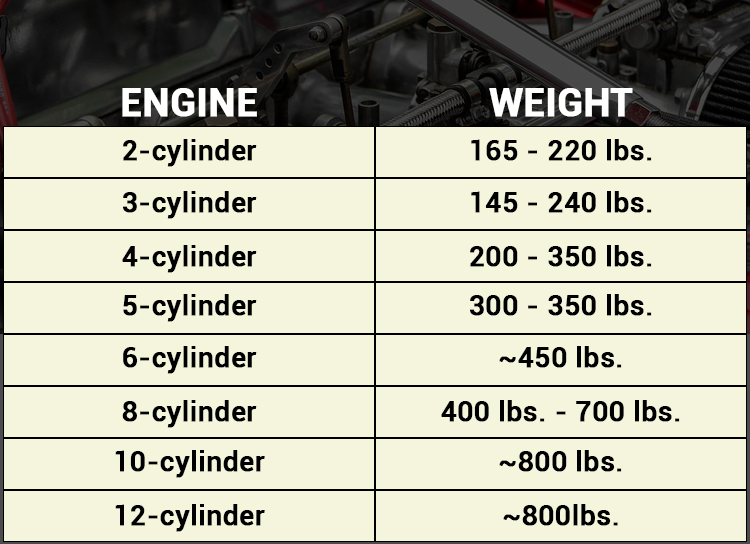A car engine typically weighs between 200 and 400 pounds. The weight of the engine will depend on the make and model of the car. For example, a smaller car may have a lighter engine, while a larger car or SUV may have a heavier engine.
The weight of the engine also affects the overall weight of the vehicle.
Car engines come in a variety of sizes and weights. The weight of the engine will depend on the make and model of the car. However, most car engines weigh between 200 and 400 pounds.
The weight of the engine is important because it affects the overall performance of the car. A heavier engine will typically provide more power, while a lighter engine will be more fuel efficient. When choosing a car, it is important to consider the weight of the engine to ensure that you are getting the right vehicle for your needs.
Average Weight of a 4 Cylinder Car Engine
An average weight of a 4 cylinder car engine is about 500 lbs. This number will, of course, differ based on the make and model of the vehicle. The weight of an engine also differs based on whether it is a gas or diesel engine.
A gas engine typically weighs less than a diesel engine.
The weight of an engine is important to consider when buying a car. Heavier engines tend to be more powerful, but they also use more fuel and can add significant weight to a vehicle.
Lighter engines are usually more fuel efficient, but they may not have as much power. Choose the right engine for your needs to get the most out of your car!
Credit: autotrends.org
What is the Weight of Car Engine?
A car engine typically weighs between 200 and 300 pounds. The weight of the engine will vary depending on the make and model of the car. For example, a smaller engine in a compact car may weigh as little as 100 pounds, while a larger engine in an SUV could weigh 400 pounds.
The weight of the engine is just one factor that contributes to the overall weight of the vehicle.
How Heavy is a 6 Cylinder Engine?
Assuming you are asking about the weight of a 6 cylinder engine without any fluids, the average weight is between 400 and 700 pounds. The weight can vary depending on the materials used in construction, but most engines will fall within this range. Keep in mind that an engine with fluids can weigh much more than this.
A full engine with oil can easily weigh over 1000 pounds. So if you are planning on lifting or moving an engine, be sure to account for all the fluids that may be inside.
How Much Does a 2.0 Engine Weigh?
A 2.0 engine weighs approximately 200 pounds. The weight will vary depending on the make and model of the car. For example, a Honda Civic 2.0 engine weighs about 300 pounds, while a Toyota Camry 2.0 engine only weighs about 250 pounds.
How Heavy is a Car Engine Block?
The average car engine block weighs between 200 and 400 pounds. The weight of the engine block will vary depending on the make and model of the car. Some factors that can affect the weight of an engine block include the size of the engine, the type of metal used, and whether or not there are any special features or additions.
For example, a V8 engine block is going to weigh more than a four-cylinder engine block. This is because a V8 engine has eight cylinders, whereas a four-cylinder engine only has four cylinders. The more cylinders an engine has, the heavier it is going to be.
The type of metal used in an engine block can also affect its weight. Aluminum blocks are going to be lighter than cast iron blocks. This is because aluminum is a lighter metal than cast iron.
So, if two different cars have engines with identical specifications but one has an aluminum block and the other has a cast iron block, the car with the aluminum block is going to have a lighter engine. Some engines also have special features or additions that can add to their weight. For example, turbochargers and superchargers are often added onto engines to increase their power output.
These components add extra weight to an engine since they are made out of metal and contain other moving parts like fans or turbines.
How to measure weight of car engine
Conclusion
A car engine typically weighs between 200 and 300 pounds. The weight of an engine varies depending on the make and model of the vehicle. For example, a smaller car may have a lighter engine, while a larger SUV or truck will have a heavier engine.
The weight of the engine also affects how much fuel it burns and how much power it produces.

